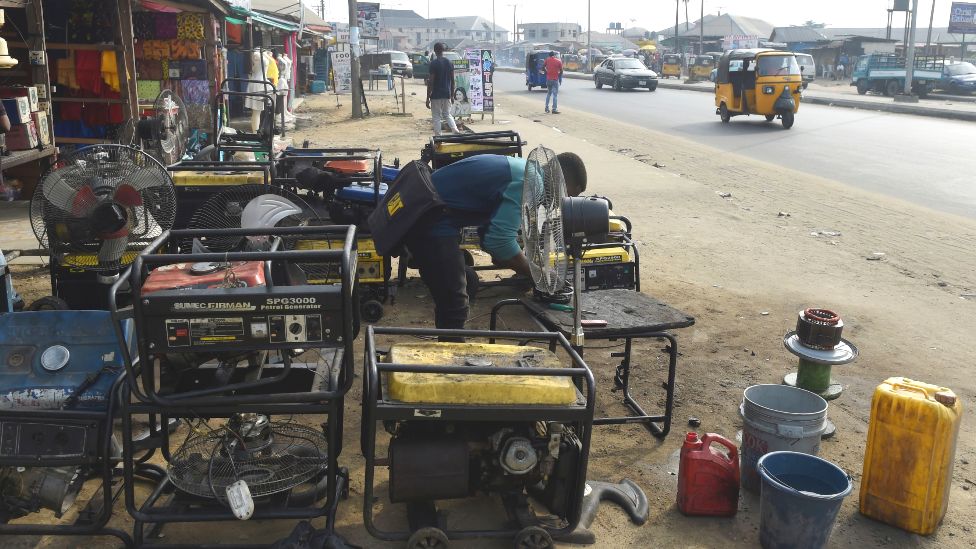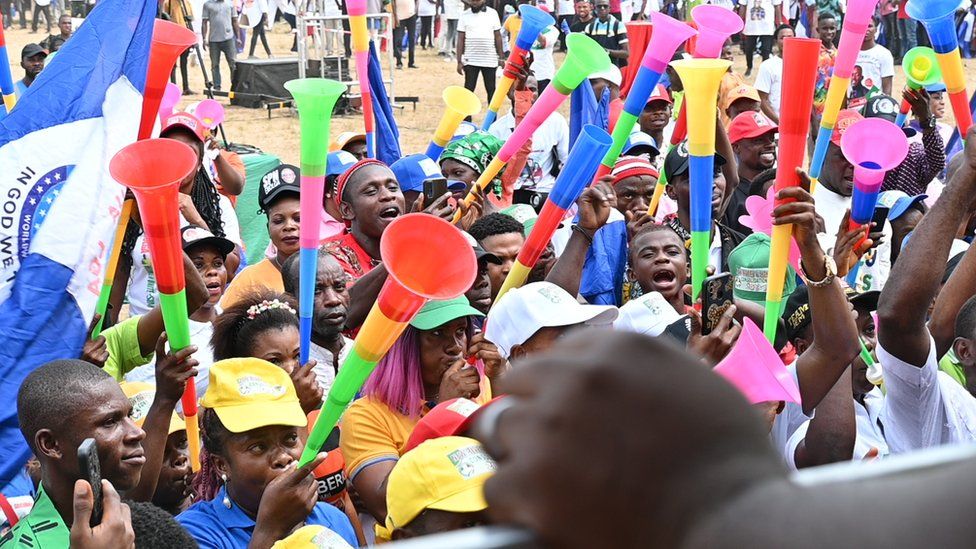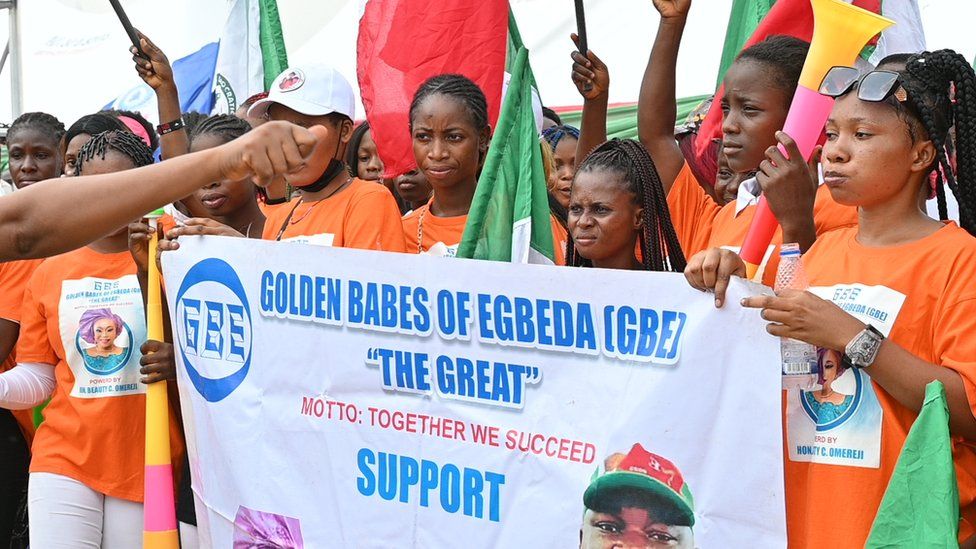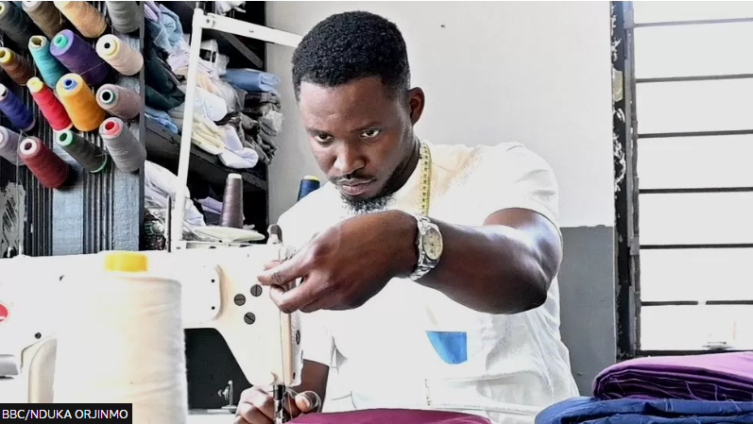There is a rhythm to the frenzy in this tailoring shop in the heartland of Nigeria's oil zone.
The whirring of four electric sewing machines, snips from two industrial-sized scissors and the sizzle of moist fabric as steam billows from a large pressing iron.
But another sounds jars as the six sweaty men work: the metallic grind of a generator. It is behind a wall to muzzle its noise, but that cannot hide its high pitch or the smoky fumes it exudes.
"I have two of those, just in case one fails," says Ozu Adah, a lean-muscled man with cropped hair who runs this shop in Choba, a university community in the southern state of Rivers.
Like millions of other small business owners in Nigeria, the 37-year-old tailor cannot rely on electricity from the national grid as blackouts are common and the 5,000 megawatts distributed is only enough to serve around five million average households in urban areas.
Most of Nigeria's 210 million people must provide their own electricity - Africa's largest economy is run on a variety of Chinese- and Lebanese-made generators
"Since I was born I have never experienced stable power supply. We call ourselves the giant of Africa but we can't fix electricity," complains Mr Adah as he works on a buttonhole.
Despite being blessed with large oil and gas reserves and hydro and solar resources, successive governments since independence in 1960 have failed to achieve a stable electricity supply.
With just weeks to the next presidential election, all three front-runners - Bola Tinubu of the ruling All Progressives Congress (APC), Atiku Abubakar of the Peoples Democratic Party (PDP) and Peter Obi of the Labour Party - have listed fixing the power supply as a key point in their manifestoes.
Though the campaign promises can sound hollow given outgoing President Muhammadu Buhari failed to deliver during his eight years in office on providing at least 20,000 more megawatts.
Mr Adah's operations rely on electricity and he spends 3,000 naira ($6, £5) daily to fuel his generator.
But since November, there has been a widespread shortage of fuel in Nigeria, which has worsened recently, forcing many to sleep overnight in queues at petrol stations.
He is frustrated that he lives in an oil-rich state with so little to offer its citizens.
As a boy he dreamed of working in the oil industry - as his father had done. But by the time he finished studying geology at the University of Port Harcourt, he was unable to find a job in that sector.
Instead, he turned to what he saw his mother do - making clothes. She used the popular but labour-intensive manual Butterfly machines imported from China.
Like a generation of young people forced to turn to jobs they would rather not do - he found an innovative way of pursuing it, using modern electric-powered machines.
They are three times more efficient - but need electricity.
'No money in electricity'
Those in the electricity sector complain that the business environment does not encourage expansion as they are unable to make profits, let alone break even.

Nigeria has 200 trillion cubic feet of natural gas reserves - the largest in Africa and ninth in the world - and 25 out of 28 electricity generating firms (a mix of public and private ownership) are powered by gas.
But investors say low tariffs - set and regulated by the government - discourage investment.
"Nobody will invest in what is clearly a loss-making venture," said Olumuyiwa Abiodun, CEO of private electricity supplier Eden Power.
Many electricity customers, such as Mr Adah's tailoring shop and thousands of households in Choba, are unmetered, and have to pay an estimated bill that is usually at variance with what they consume.
Mr Adah's monthly electricity bill is 8,000 naira ($17, £14) for the compound in which he has his business, a house with at least eight rooms and two flats.
Many Nigerians do not even pay for electricity.
"Many communities here don't want to pay for electricity as they feel the gas belongs to them," said John Onyi, a Port Harcourt-based electricity consultant.
Mr Adah, like many younger people in urban parts of Nigeria, is rooting for Mr Obi, who hails from south-eastern Nigeria.
He believes the 61-year-old politician is serious about fixing the power sector, pointing out that the Labour Party candidate visited Egypt last year to study that country's electricity supply system.
"He is not yet president and he has travelled to learn how to fix the problem, it clearly shows how committed he is to solving it," he says.
Key battle ground
Like most residents in Choba, he has voted for only the PDP in the past but his intended switch this time to the Labour Party is reflective of how Rivers state has emerged as a key battleground in this presidential election.

Its 3.5 million registered voters are the fourth highest in Nigeria's 36 states, yet their loyalty is being tested with the APC and Labour Party seemingly making sizeable inroads that could split the vote.
Rivers state reveals some of the internal battles the PDP is facing.
Outgoing Governor Nyesom Wike tried to win the PDP's presidential ticket - supported by four other powerful PDP governors - and is suspected to be backing Mr Tinubu, the APC candidate.
A larger-than-life politician who travels with his own band, Mr Wike continues to support the PDP at the state level and is backing the PDP candidate for governor.
Many in Rivers state also seem to be wearing this dual-cap - wanting to vote for one party at the state level and perhaps another in the presidential election.
This was on show when thousands turned up for the PDP rally across the Choba River at Rumuji, an oil-producing village near Bayelsa state.
To witness a rally in a small village, far away from the city centre, is to be treated to what Nigerians call "party structure" - the well-oiled campaign machinery that many believe is only available to the APC and PDP countrywide.
Under the sun, women, men and youths, most hired by local politicians, gathered. Today they are here for the PDP, tomorrow it may be for another campaigner.
One woman in a blonde wig ushered a dozen disinterested teenagers from a canopy into the sun their banner said: "Golden Babes of Egbeda". They jostled for a space around a podium that included Joseph Yobo, a former Nigerian international footballer, and musician Harrysong.
The noise was as chaotic as the spectacle - an array of colours turned sepia from the fine dust raised by the thousands of legs trampling the earth.
There was a group blowing dozens of vuvuzelas, the latest addition to Nigeria's campaign rallies.

But this was more than a jamboree for local government, it was the governor's show of force on a national stage. He wanted to show the main contenders his influence before he officially says which presidential candidate he will back.
"They can't win the election without Rivers state, let them try it," said Mr Wike to a rapturous cheer when he took to the stage.
His personal band played during an interlude - a song about him being a big man, to which he swayed.
Outside the rally ground a tailor sewed a wax-print garment, seemingly oblivious to the chaos across her.
On loud speakers, the governor made a promise to electrify parts of the community still without power.
But it did not matter to her - she was using a brown manual Butterfly sewing machine.
Latest Stories
-
To chocolate, Ghana’s pride by Bioko
8 minutes -
Chartered Institute of Bankers, Ghana, confers Honorary Fellow status on Victor Yaw Asante
31 minutes -
BoG marks end of year with Thanksgiving Service
42 minutes -
Ghana’s Next Sports Minister: The Debate Begins
59 minutes -
Election 2024: NPP advised to be mindful of the reasons being ascribed to their election lost
1 hour -
GNFS urges Ghanaians to prevent fires during yuletide
1 hour -
Report tobacco users who smoke publicly – FDA advises
2 hours -
Abdallah Ali-Nakyea elevated to Associate Professor at UG School of Law
2 hours -
Kick2build commissions 5 libraries in Klo Agogo, donates school supplies
2 hours -
Slim and Fit Ghana donates to kids at Motherly Love Orphanage in Kwabenya
2 hours -
We’ll be reorganising ourselves for the battles of tomorrow – NPP
3 hours -
Ghanaian teacher Morkporkpor Fiador’s GWR Read-A-Thon attempt postponed
3 hours -
Revocation of licences of UT, Capital banks were strict requirements from IMF – Dr. Addison
3 hours -
MP Cynthia Morrison among 280 members expelled by Agona West NPP
3 hours -
NPP to set up committee to investigate 2024 election defeat – Stephen Ntim
3 hours

